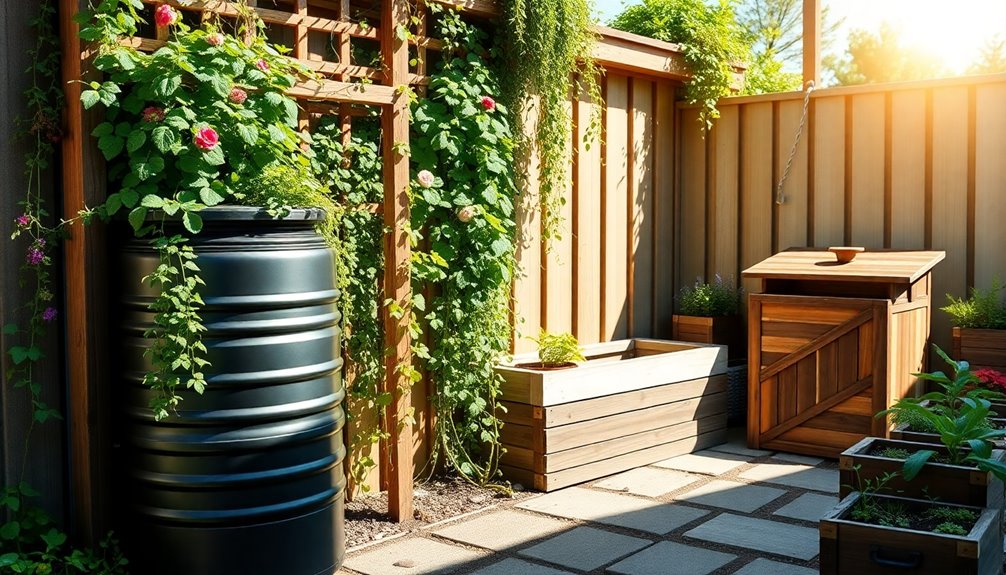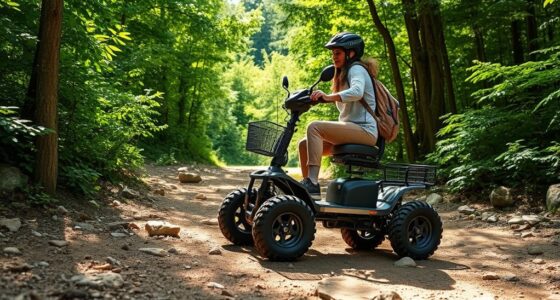You can boost your home's sustainability with seven impactful DIY projects. Start by upgrading to LED lighting to cut energy costs and waste. Build a compost bin to enrich soil naturally or create a recycled rain barrel to conserve water. Don't forget to start a kitchen scrap vegetable garden and make your own cleaning products to eliminate harsh chemicals. Finally, consider upcycling thrifted items for unique decor. Keep going to uncover more eco-friendly ideas!
Key Takeaways
- Upgrade to LED lighting to significantly reduce energy consumption and save money over time while minimizing waste.
- Create a compost bin to enhance soil fertility and support a sustainable ecosystem while reducing reliance on chemical fertilizers.
- Build a recycled rain barrel to capture rainwater for chemical-free irrigation, promoting water conservation using secondhand materials.
- Make your own eco-friendly cleaning products using natural ingredients to reduce harsh chemicals in your home environment.
- Embrace upcycling by transforming thrifted items into unique decor, promoting sustainability and creativity while reducing waste.
Upgrade to LED Lighting
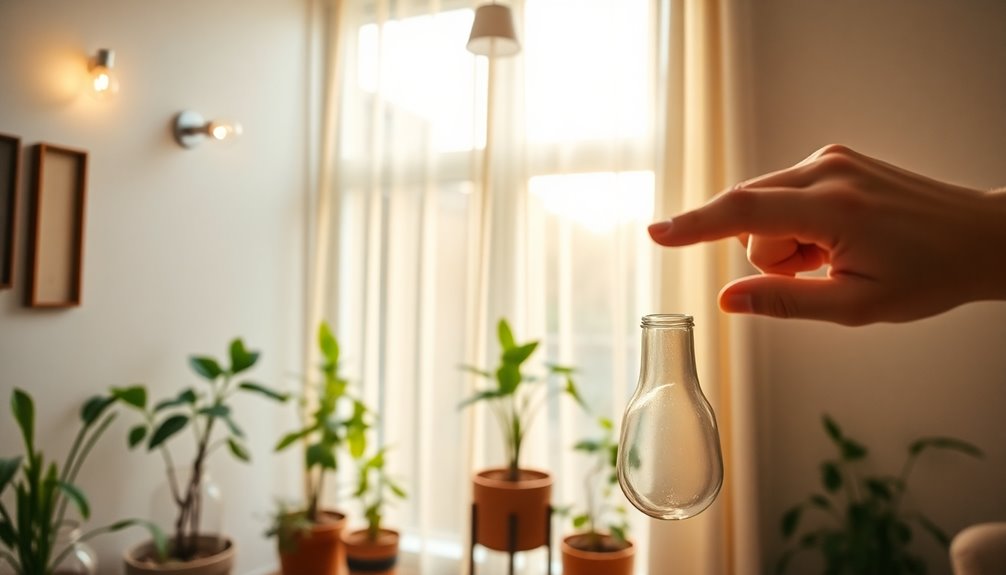
If you're looking to make a sustainable change in your home, upgrading to LED lighting is a smart choice.
These bulbs can reduce energy consumption by up to 75% compared to traditional incandescent options, leading to significant savings on your electric bill.
With an impressive lifespan of up to 25 times longer than incandescent bulbs, you'll replace them less often, which helps reduce waste.
Plus, fewer bulbs in landfills means you're making an environmentally friendly decision.
You'll also enjoy lower heat emissions, which can decrease the need for air conditioning during warmer months, further cutting energy costs.
In the long run, the average household can save around $225 over an LED bulb's lifetime, making this upgrade a win-win for both your wallet and the planet.
Create a Compost Bin

Creating a compost bin not only helps you reduce household waste but also enriches your garden soil. By taking just 4-6 hours to build a simple wood and chicken wire compost bin, you can effectively compost food scraps and yard waste, keeping organic materials out of landfills.
To create a compost bin that works well, balance green materials like vegetable scraps with brown materials like dry leaves. This mix enhances soil fertility and reduces the need for chemical fertilizers. Additionally, incorporating compost into your garden can enhance soil fertility and support healthy plant growth.
Plus, composting supports local wildlife, contributing to a sustainable ecosystem in your garden. You can find guidance and resources from the NRDC to help save you time and effort as you start your composting journey.
Build a Recycled Rain Barrel

A recycled rain barrel is a smart and sustainable solution for capturing rainwater, which can considerably reduce your reliance on municipal water for gardening and landscaping.
By utilizing a secondhand container, you not only save money but also promote sustainability through reduced waste. You can create a simple rain barrel system for under $100, making it an affordable DIY project that enhances water conservation at home.
Adding a stylish cover made from reclaimed wood can improve its appearance while keeping debris out of the collected water. Collecting rainwater also provides a chemical-free irrigation source for your plants, promoting healthier gardens and helping to lower your water bills. Additionally, using a heat pump can further enhance your home's sustainability by efficiently managing your heating and cooling needs.
Start this project today and contribute to a greener future!
Start a Kitchen Scrap Vegetable Garden
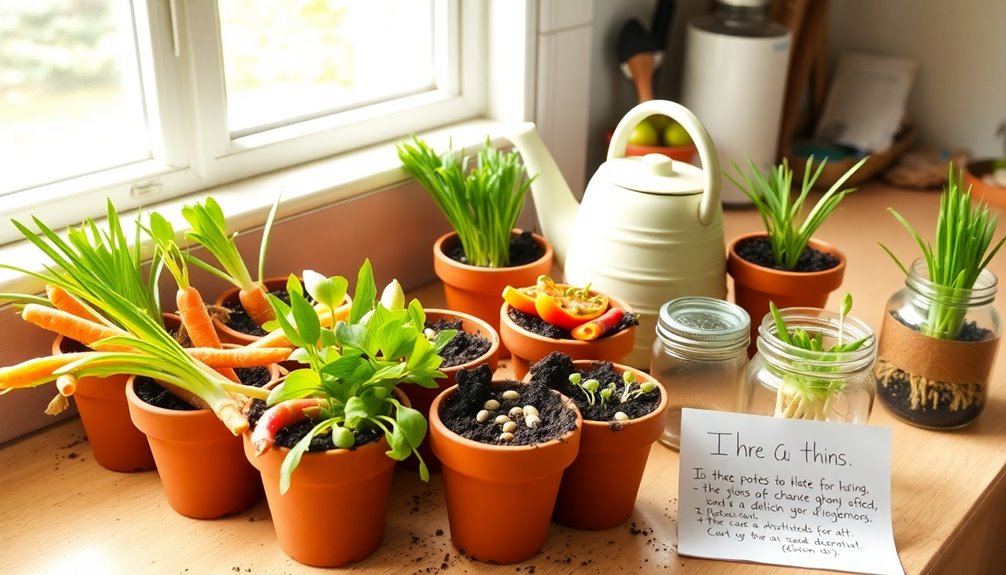
Starting a kitchen scrap vegetable garden is a simple and rewarding way to grow fresh produce right at home. You can easily regrow vegetables like green onions and lettuce using just a few essential supplies, making it accessible even for beginners. Not only will you save money on groceries, but you'll also embrace sustainable practices by reducing food waste. Additionally, utilizing Hogwarts Greenhouses as inspiration can help you understand the importance of nurturing plant life for optimal growth.
Easy Vegetable Regrowth Techniques
While you might think gardening requires a lot of space and effort, easy vegetable regrowth techniques can transform your kitchen scraps into fresh produce with minimal commitment.
You can make a real difference in reducing waste and enjoying homegrown flavors. Try these simple methods to help kickstart your indoor garden:
- Place green onion roots in a glass of water, changing it every few days for continuous growth.
- Put the base of lettuce in a shallow dish of water; watch new leaves sprout in just days.
- Regrow celery by following similar steps, keeping it hydrated and in sunlight.
These techniques not only save you money but also foster a closer connection to your food sources, encouraging symbolic thinking as children learn about the origin of their food. Enjoy your green thumb!
Essential Supplies Needed
To kick off your kitchen scrap vegetable garden, gather a few essential supplies that will set you up for success. Start with a container that has drainage holes, like a pot or recycled jar, to hold your vegetable scraps and promote healthy growth.
You'll also need nutrient-rich soil or compost to provide the necessary nutrients for your plants. Collect kitchen scraps such as green onion roots, potato eyes, and celery bases, which you can regrow in water or soil.
Make sure to choose a sunny spot that gets at least 6-8 hours of sunlight daily. Finally, regular watering is vital—keep your scraps moist but avoid overwatering to prevent them from rotting. This will help you reduce waste and create a thriving garden. Additionally, engaging in this project can enhance your mental wellbeing by fostering a sense of accomplishment and connection to nature.
Benefits of Home Gardening
Engaging in a kitchen scrap vegetable garden not only helps reduce food waste but also offers an array of benefits that enhance your home and lifestyle.
By using scraps like green onions and lettuce, you'll not only save money on fresh produce but also contribute to significant home improvement. This simple practice promotes sustainability and self-sufficiency while utilizing your outdoor space effectively.
- You'll enjoy fresher, organic produce straight from your garden.
- It's a fun and educational activity that anyone can start, regardless of gardening experience.
- Your efforts will help in reducing waste and encouraging a healthier environment. Additionally, this project can foster problem-solving abilities as you figure out the best ways to grow and maintain your garden.
Start your kitchen scrap garden today and transform waste into valuable resources!
Make Your Own Cleaning Products
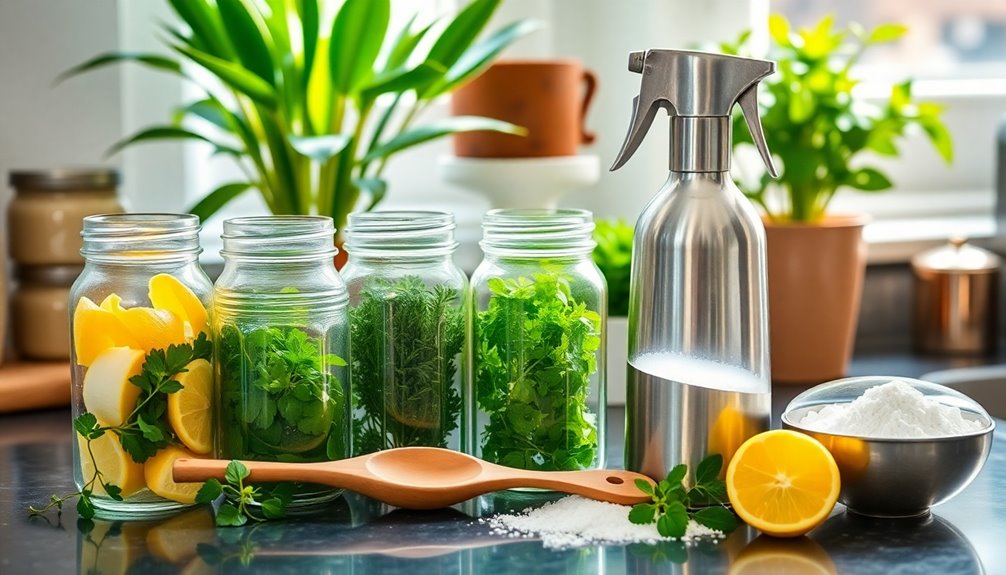
Creating your own cleaning products not only cuts down on harsh chemicals but also gives you control over what goes into your home. You can easily make your own cleaning products that are both effective and safe.
For an all-purpose cleaner, mix equal parts of white vinegar and water, and consider adding lemon and rosemary for a fresh scent.
A simple glass cleaner can be made with water, apple cider vinegar, and rubbing alcohol, plus a few drops of essential oils for a lovely fragrance.
For tough stains, combine lemon juice with borax powder for a heavy-duty scrub.
Finally, polish your faucets and cabinet pulls by mixing salt with vinegar or lemon juice, achieving a natural shine effortlessly.
Install Low-Flow Showerheads
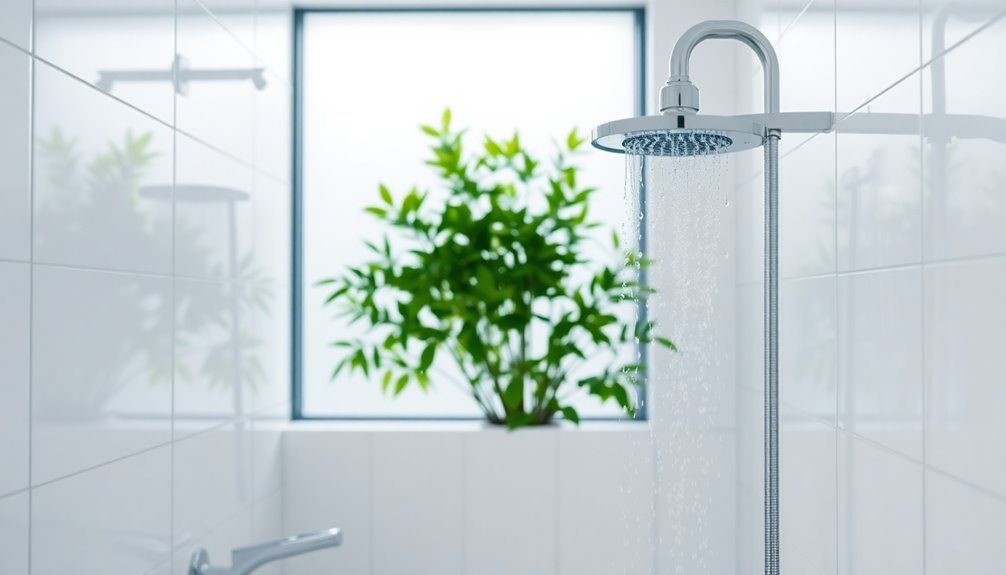
Although it might seem like a small change, installing low-flow showerheads can have a significant impact on your water usage and utility bills. By switching to a low-flow showerhead, you can reduce water usage by up to 40%, saving around 2,700 gallons annually for an average family.
These showerheads use no more than 2 gallons per minute while still providing good water pressure. Plus, if you shorten your showers to five minutes, you'll see even greater savings. This simple upgrade not only benefits your wallet but also makes a positive impact on the environment.
- Conserve water effortlessly
- Enjoy a comfortable shower experience
- Support sustainable living practices
Upcycle Thrifted Items
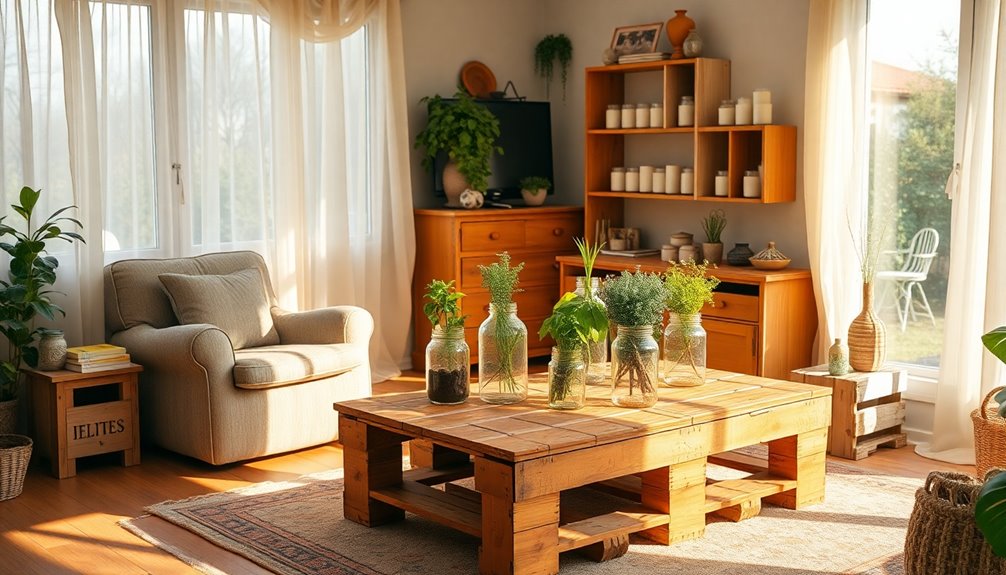
There's something thrilling about discovering hidden gems at thrift stores that can be transformed into stunning home decor. By choosing to upcycle thrifted items, you not only create unique pieces but also play a crucial role in reducing waste and promoting sustainability. Additionally, incorporating sustainable materials into your designs can enhance the eco-friendliness of your home.
| Thrifted Item | Upcycling Idea | Benefits |
|---|---|---|
| Wooden Furniture | Sand and repaint | Fresh look, prolonged lifespan |
| Picture Frames | DIY art projects | Personalized, eco-friendly decor |
| Lampshades | Customize with paint/fabric | Unique lighting solutions |
| Baskets and Crates | Create storage solutions | Organization and repurposing |
Each project lets you express your style while giving a second life to items that might have otherwise ended up in landfills. Embrace the thrill of thrift!
Frequently Asked Questions
How Do I Make My Home More Sustainable?
To make your home more sustainable, start with simple changes.
Swap out traditional bulbs for energy-efficient LED ones to cut energy use.
Install a rain barrel to collect rainwater for your garden, saving both water and money.
You can also compost kitchen scraps to enrich your soil while reducing landfill waste.
Finally, consider using low-flow showerheads and creating DIY reusable items to minimize your environmental impact and promote a greener lifestyle.
How Do I Make My Home Green?
To make your home green, start by swapping out traditional light bulbs for energy-efficient LEDs; you'll save on electricity.
Consider installing a rain barrel to collect free water for your garden.
Composting is another great step; it cuts down on waste and enriches your soil.
Upgrade to low-flow showerheads to conserve water, and choose native plants for landscaping, which require less maintenance and support local wildlife.
Every little effort counts!
Do You Have Any Other Ideas to Make a Home Environmentally?
You can enhance your home's environmental impact in several ways.
Start by switching to energy-efficient appliances, which cut energy usage considerably.
Consider creating a rain garden with native plants to manage runoff effectively.
Implement a greywater recycling system to reuse water for irrigation.
Installing a programmable thermostat can optimize your energy use, too.
Finally, use natural cleaning products to maintain a healthier indoor environment while reducing harmful chemicals.
How Can Households Be More Sustainable?
You might be surprised to learn that simple changes can drastically improve your household's sustainability.
Start by switching to LED bulbs; they save energy and last much longer than traditional bulbs.
Fixing leaky faucets and installing low-flow showerheads can cut your water usage considerably.
Composting organic waste enriches your garden while reducing landfill waste.
Plus, collecting rainwater for irrigation conserves even more water.
Supporting local businesses helps the environment too.
Every small effort counts!
Conclusion
By tackling these DIY projects, you're not just enhancing your home's sustainability; you're also creating a space that reflects your values. You might think you don't have the skills or time, but each project is designed to be simple and rewarding. Plus, the sense of accomplishment you'll feel is worth every minute spent! So immerse yourself, get creative, and enjoy the positive impact you're making on both your home and the planet.
